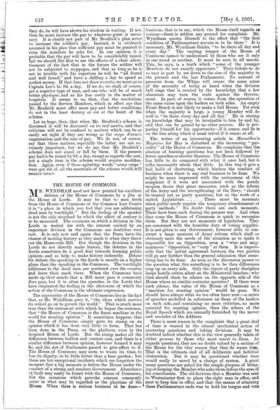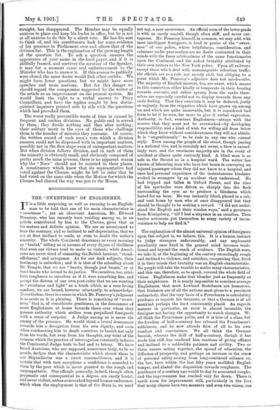THE HOUSE OF COMMONS.
MR. WYNDHAM need not have pointed his excellent defence of the House of Commons by a jibe at the House of Lords. It may be that to men fresh from the House of Commons or the Common Law Courts it'is "a place in which you feel that you are addressing dead men by torchlight." But the feeling of the speaker is.not the only standard by which the effect of oratory is to .be measured. The occasions on which a division in the Lords is waited for with the interest excited by an important division in the Commons are doubtless very rare. It is only now and again that the Peers have the chance of making history as they made it when they threw out the Home-rule Bill. But though the divisions in the Lords do not directly make history, the debates in the Lords sometimes do a good deal towards forming public opinion, and so help to make history indirectly. Debate for debate, the speaking in the Lords is usually on a higher plane than the speaking in the Commons. The torchlight addresses to the dead men are scattered over the country rigid leave their mark there. When the Commons have made up their minds that a Bill must pass it commonly does pass, but it is often the speeches in the Lords that have originated the feeling in the electorate of which the action of the Commons is the ultimate expression.
The superiority of the House of Commons lies in the fact that, as Mr. Wyndham puts it, " the ideas which survive its.ordeal go on to govern the world." That is much more true than the statement with which he began the sentence, that " the House of Commons is the finest machine in the world for creating opinion." It sometimes happens that the House of Commons simply puts its stamp on an opinion which it has done very little to form. That has been done in the Press, on the platform, even in the despised House of Lords. But the stamp makes all the difference between bullion and current coin, and there is a similar difference between opinion, however formed it may be, and the Act of Parliament passed to give effect to it. The House of Commons may seem to waste its time, to lose its dignity, to be little better than a bear garden ; but these are but exceptional incidents which are forgotten the moment that a big measure is before the House under the conduct of a strong and resolute Government. Abundance of fault may easily be found. with the House of Commons, but the occasions which provoke censure commonly ()caw in what may be regarded as the playtime of the House. When there is serious business to be done— business, that is to say, which the House itself regards am serious—there is seldom any ground for complaint. Mr. Wyndham quotes Disraeli to the effect that " the first condition of Parliamentary success is to be there." It is necessary, Mr. Wyndham. thinks, "to be there all day and every day." The varying temper of the House of Commons cannot be understood by those who see it only in one mood or another. It must be seen in all moods. This, he says, is a truth which " some of the younger Members do not exactly appreciate." Their failure to do so may in part be set down to the size of the majority in the present and the last Parliaments. No amount of pressure from the Whips will create the same sense of the necessity of being at hand when the division bell rings that is created by the knowledge that a few absentees may turn the scale against the Govern- ment. In part, of course, it comes from the operation of the same cause upon the leaders on both sides. An empty Front Bench is not likely to make a full House. Yet even- when the majority is large, a young Member will do well to " be there every day and all day." He is storing up knowledge that may be invaluable to him by and by, and that can be gained by no other process. He is pre- paring himself for his opportunity—if it comes, and he is on the line along which it must travel if it comes at all.
The writer of an interesting article in Macmillan's Magazine for May is disturbed at the increasing " gar- rulity" of the House of Commons. He complains that the absence of burning questions has not been followed by fewer speeches or shorter Sessions. The House of Commons has little to do compared with what it once had, but it talks incessantly about that little. In this way it gets a bad habit of chattering, which hinders the conduct of business when there is any real business to be done. We might be more impressed with the seriousness of this complaint if it were not associated with the purely utopian desire that great measures, such as the reform of the Army and the strengthening of the Navy, " should be treated not as party questions, but as the work of a united Legislature There must be moments when public needs require the temporary abandonment of party methods." No doubt there are such moments. There have been such during the present war. And when they come the House of Commons is quick to recognise them. But they are not moments of legislation. They are concerned with the humbler duty of voting supplies. It is not given to any Government, however able, to con- struct a large measure of Army reform which shall so obviously meet the needs of the situation as to make it impossible for an Opposition, even a "wise and mag- nanimous " Opposition, to " carp " at them. It is improb- able that the initial agreement between the two parties will go any further than the general admission that some- _ thing has to be done. As soon as the discussion passes to the question what this something is to be then differences crop up on every side. Only the rigour of party discipline keeps hostile critics silent on the Ministerial benches ; why then should there be silence on the opposite side of the House where no similar restraint operates ? If there were such silence, the value of the House of Commons as a " machine for creating opinion " would be gone. We should have always what we too often have now,—a series of speeches modelled in substance on those of the leaders on each side, and containing no more criticism, no more material for creating opinion, than the echoes of the Royal Speech which are annually furnished by the mover and seconder of the Address.
There is more reason in the complaint that a great deal of time is wasted in the almost mechanical action of answering questions and taking divisions. It may be doubted indeed whether this is the view generally taken of either process by those who most resort to them. As regards questions, they are no doubt valued by a section of the House for the very reason that they do waste thle. That is the ultimate end of all deliberate and habitual obstruction. But it may be questioned whether time would really be saved by a change of system. A great many questions are asked for the simple purpose of bring ing or keeping the Member who asks them before the eyes of his constituents. The old doctrine that a Member was sent to Westminster first to place the right man in office, and next to keep him in office, and that the means of attaining these Parliamentary ends was to hold his tongue and vote straight, has disappeared. The Member may be equally anxious to place and keep his leader in office, but he is not at all anxious to do this by a silent vote. He has his seat to think of, and his constituents lOok for some evidence of his presence in Parliament over and above that of the division list. This is the explanation of the growing length of the question list. To ask a question ensures the appearance of your name in the local paper, and if it is skilfully framed, and survives the scrutiny of the Speaker, it may for a moment cause real embarrassment to the Minister who has to answer it. If this avenue to publicity were closed, the same desire would find other outlets. We might have fewer questions, but we might have more speeches and more motions. But for this danger we should regard the compromise suggested by the writer of the article as an improvement on the present system. He would limit the right to a verbal answer to Privy Councillors, and have the replies sought by less distin- guished inquirers printed side by side with the questions which had provoked them.
The worst really preventible waste of time is caused by frequent and useless divisions. No public end is served by them ; they decide nothing and they alter nothing ; their solitary merit in the eyes of those who challenge them is the number of minutes they consume. Of course, the written record of each man's vote which a division ensures could not be dispensed with in important matters, possibly not in the first staae even of unimportant matters: But when division follows °division, and in each of them the minority is obviously small, and obviously composed of pretty much the same persons, there is no apparent reason why the " Noes " should not be counted in their places. A constituency which knew that its representative had voted against the Closure might be left to infer that he had voted on the same side when the Motion for which the Closure had cleared the way was put to the House.











































 Previous page
Previous page